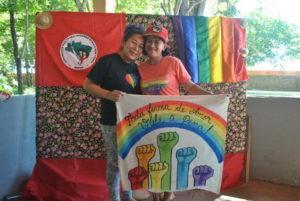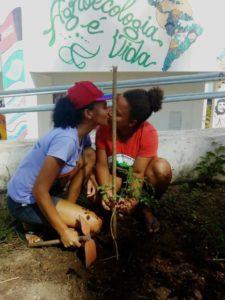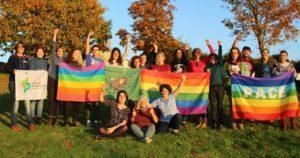LGBTQIA+ Peasants in Struggle: Free Our Land, Free Our Bodies
As part of uplifting queer and trans liberation for June, we are reposting this piece from 2021 from Capire, a publication of the World March of Women.
Lesbian, gay, bisexual, trans, queer, intersex, asexual. June 28th is International LGBTQIA+ Pride Day. The LGBTQIA+ struggle is diverse and faces different challenges in different parts of the world. The LGBTQIA+ grassroots feminist peasant struggle encompasses and transcends the sense of pride one feels in their own existence—it’s about the action of a collective will to promote change toward a world without the fences that control the land and without those that control bodies and sexualities. But this peasant struggle is usually hidden behind hegemonic discourses about who LGBTQIA+ subjects are, as if this were an urban or individual issue. Capire spoke with Paula Gioia, Yeva Swart, Cony Oviedo, and Alessandro Mariano, members of La Via Campesina in Europe and South America, about the participation and the contributions of LGBTQIA+ people to the collective political knowledge of the peasant movement.
Paula Gioia is a Brazilian migrant apiarist in Germany, a member of the Association for Peasant Agriculture (Arbeitsgemeinschaft bäuerliche Landwirtschaft—AbL), and a representative for Europe in the International Coordination Committee of La Via Campesina. Yeva Swart is a Dutch sheepherder in France and a member of Farmers for the Future (Toekomstboeren). Cony Oviedo is an educator, communicator, poet, and member of the National Coordination of Indigenous and Rural Women Workers’ Organization (Coordinadora Nacional de Organización de Mujeres Trabajadoras Rurales e Indígenas—CONAMURI) in Paraguay. Alessandro Mariano is an educator and a member of the National LGBT Collective of the Landless Workers’ Movement (Movimento dos Trabalhadores Rurais Sem Terra—MST) in Brazil.
THE REAL LIVES OF LGBTQIA+ PEASANTS
In the world we live, coming out as gender nonconforming often means feeling lonely. Gender binarism and heteronormative family standards often become obstacles to experiencing diversity, a control that can lead to silence, violence, depression, and alienation. The media and religious sectors promote prejudicial stereotypes that dictate what an LGBTQIA+ person “looks like” or “doesn’t look like.” “There is an association with an image of someone who likes to have fun, and not someone who can be disciplined or have a life project,” Cony Oviedo says.
When people find out you are a lesbian, they say, “you don’t look like it”
In several parts of the world, people leave rural territories to escape precarious wage work and conflicts with destructive megaprojects imposed by big corporations, pursuing promises of a “better life” in the city. Additionally, family traditions and moral standards in the countryside are also reasons that lead LGBTQIA+ peasants to leave rural areas.
“Although in Europe there is not the same level of violence that LGBT people face in other countries, rural areas are often still not a welcoming place for gender diverse people,” Paula Gioia says. “It’s important to understand and highlight that, when you don’t need to worry about hiding yourself, your sexuality, and gender identity, you can contribute much more to our common struggle towards food sovereignty.” Especially after the hardships that emerged during the pandemic, many young people are willing to return to the countryside. Organizing communities is a possible strategy to come back stronger and promote mutual support. “Building and living as communities is already such a queer way of living and working together.”
For fear of the stigma, many sisters and comrades hide themselves and will only say “I’m lesbian,” “I’m bisexual,” when they are in spaces they trust… In the communities, there is a culture that passes on from generation to generation. We must promote a cultural change in our behaviors and roles and formulate ways to stop seeing these commands that seem right as if they were natural.
Cony Oviedo

Rural areas are diverse and vast, although this is often invisibilized. Indigenous communities, people from traditional Black communities, peoples from forests and waters, small farmers, herders, fishers, beekeepers, migrants, and seasonal workers, who have such diverse ways of living and forms of experiencing their sexuality. In the global South, these multiple possibilities have been and continue to be obstructed by colonial, slave-like, imperialist interventions. “How does the violence imposed against our ancestors’ bodies continue to this day against our bodies as well?” Alessandro Mariano asks.
FOOD SOVEREIGNTY AND FREEDOM TO BE AND LOVE THE WAY WE WANT
LGBTQIA+ people are struggling to continue to live in rural areas, resisting agribusiness and producing healthy food and healthy relationships. “Between capitalism and patriarchy, they want to tell us it’s all divided, that we are not one,” Cony says. For La Via Campesina, these are not different fronts, and separating them into different “boxes” leads to fragmentation that blocks change. The peasant, feminist, Black, Indigenous, migrant, and LGBTQIA+ struggle is a comprehensive struggle for the liberation and self-determination of body-territories and land-territories.
There is a direct relationship of solidarity between those who produce food and struggle for food sovereignty and the people who need food the most. Yeva Swart says, “often the rhetoric around LGBTQ people is about love, and I think it is much more than that. LGBT struggles and food sovereignty is also about questioning certain powers.” Paula adds, “the problems that we have are based on patriarchy and power relations, not on what nature actually offers.”

THE LGBTQIA+ STRUGGLE IS FEMINIST AND ANTI-PATRIARCHAL
For many years, La Via Campesina has been building grassroots peasant feminism as a tool for women’s struggle and organizing. In Europe, the movement is also working on the concept of queer feminism, fighting the binary model of patriarchy. By promoting a feminist conversation and practices that are rooted in their territories, the women in the movement face violence and the sexual division of labor, while playing a key role in food sovereignty, producing food, protecting seeds, and sustaining life.
According to Cony Oviedo, “La Via Campesina’s grassroots peasant feminism is built from the needs of our sisters. It’s feminism from everyday life, struggling against agribusiness, mining, and extractivist companies, and it carries the flag for agroecology and food sovereignty.” “We live in a binary world where genders overlap. Transsexuality disrupts that, including nonbinary,” Alessandro Mariano adds. Sexual and gender diversity is not just about being able to love whoever you want, but also about being able to exist as you are: trans, homosexual, bisexual, intersexual, or asexual.
The struggles waged by women and LGBTQIA+ people come together as they challenge the control and violence perpetrated by racist and heteropatriarchal capitalism against bodies and territories. They also come together in the desire to promote change toward an equal and free society.
Peasant feminism is actively fighting against intersectional prejudices faced in today’s society. The core of it is that LGBT people and women are questioning gender roles, and the imposed division of work. — Yeva Swart
Grassroots organizations are tasked to radically change society, and this includes building relationships of camaraderie, respect, and parity. This way, organizing spaces can be territories that are free from inequality, exploitation, and discrimination. “In the long-established tradition of the peasant struggle, which is deep-rooted in the idea of male leaders, there is a process of expanding this struggle to include women and all this diversity. More women, more trans, lesbian, and bisexual people,” Alessandro says about the challenges facing La Via Campesina.
The experience in Europe also points to the need to change the bases of patriarchal relationships. “The roles for male and female on the farms are often very strict. There are a lot of similarities in the different European countries and the discussion that we launched in the European Coordination Via Campesina (ECVC) was important to realize and understand that each of us is not alone and, secondly, to start developing strategies to strengthen ourselves and our contributions to the movement as well,” Paula says.

GRASSROOTS PRACTICES IN EVERYDAY LIFE TO FACE LGBTQIA-PHOBIA
Around 2015, different organizations with La Via Campesina started to discuss an LGBTQIA agenda and organization. It took courage and sensitivity to conduct this process, considering the cultural, age, and regional diversity of La Via Campesina across the 81 countries where it is present.
In Europe, the conversations about these topics started during the 2015 Women’s Assembly in the framework of the ECVC General Assembly, where the debate really started to get traction. “One of our member organizations, Sindicato Labrego Galego [Galician Peasants’ Union], immediately adopted this agenda to their work and, as they usually say, ‘they came out as an organization,’” Paula says. In 2017, the Basque Country hosted the 7th International Conference of La Via Campesina, which became a milestone as the starting point for building the LGBTQIA+ struggle on an international level within the organization.
Paula explains that “gender diversity was not part of the official agenda of the conference. We managed to prepare, previously to the conference, some actions for the conference. We organized an exhibition with pictures, articles, and materials from different regions. People were walking around the conference with stickers and pins with the rainbow flag. Our strategy was to start bringing this agenda in ‘homeopathic doses’ to the movement.”
This process eventually led to the 1st LGBTIQ Meeting of the European Coordination Via Campesina, in 2018, dedicated to building spaces for sexual and gender diversity within peasant organizing. On June 28th, La Via Campesina Europe takes the opportunity on International LGBTQIA+ Pride Day to launch the publication Embracing Rural Diversity: Genders and Sexualities in the Peasant Movement,in Spanish, English, and French, featuring militants’ political stories about their personal and collective experiences and reflections.
The seed of the LGBT collective of La Via Campesina Brazil was planted in 2015, when it started to organize seminars and meetings. The collective was effectively established in 2020, with the participation of ten organizations, holding monthly meetings and formulating a synthesis that was organized in a publication.
In Paraguay, the CONAMURI started to collectively build a process in 2016 to tackle LGBTQIA-phobia, inspired by the Brazilian experience. That same year, the Aireana collective, an organization of lesbian peasant women, proposed that the CONAMURI should organize a landless LGBTI meeting in Paraguay. Later, in 2017, the CONAMURI also became closer to the Panamby collective of trans women who create art interventions. The exchanges and activities were fundamental for the national coordination of the CONAMURI to take on the topic as part of its agenda.
Today, the militants of the two countries are organizing to build a regional effort of LGBTQIA+ people with La Via Campesina in South America. This way, LGBTQIA+ peasants feel more welcomed by the organization, because their existence is no longer defended just individually, but by the entire movement. In May this year, in Brazil, the MST lost Lindolfo Kosmaski, a militant, peasant, teacher, and gay man who was killed in his own community. For militants, the murder of Lindolfo is a consequence of the hate resulting from the rise of conservatism.
Patriarchy destroys, capitalism wages war, LGBT blood is landless blood too! MST
According to Yeva, talking about gender diversity is the right thing to do in face of the current political situation. “There is a growing right-wing in Europe with a lot of anti-LGBT laws being adopted. People are struggling against patriarchy and religious ideas as well about gender and about sexuality. From the situation of women or LGBT people, the same issues arise when it comes to peasants’ rights, for example regarding access to land and inheritance.”
About this international movement building, Paula recalls that, “in some countries where we have membership, being homosexual or transexual is still reason for you to go to jail. In some places it’s so prohibited that people are killed.” This is why the struggle is not homogeneous. Paying attention to specific aspects that are different in every place is a powerful way to build a multiple and diverse organization of LGBTQIA+ peasants, who are political actors fighting for food sovereignty. “That’s why it is so important for us to build very strong regional processes of discussion. Once we have different strong regional processes we can build it at the international level. We are working in that direction and the work from some regions can serve as inspiration to other regions.”

